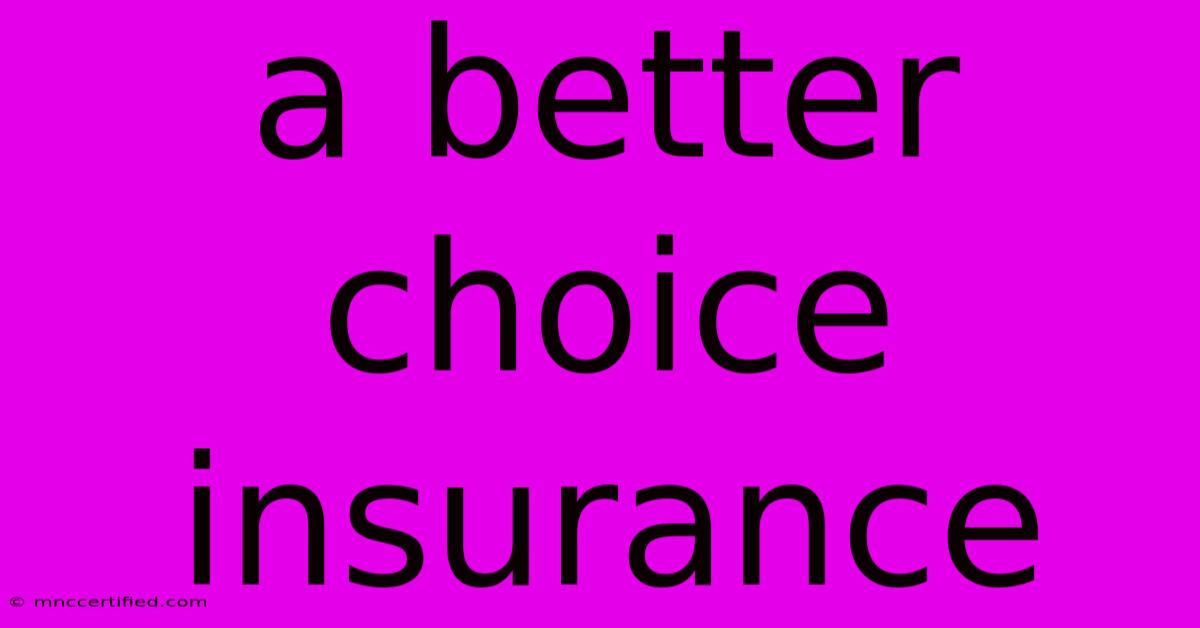A Better Choice Insurance

Table of Contents
Finding a Better Choice Insurance: Your Guide to Smarter Coverage
Choosing the right insurance can feel overwhelming. With so many providers and plans available, how do you find the better choice insurance for your specific needs? This comprehensive guide will walk you through the process, helping you navigate the complexities and make informed decisions.
Understanding Your Insurance Needs
Before diving into specific providers, it's crucial to understand your individual requirements. What are you insuring? A home? A car? Your health? Business assets? The type of insurance you need will significantly impact your search for a better choice insurance provider.
Key Questions to Ask Yourself:
- What are my assets worth? This is essential for determining adequate coverage amounts for home and auto insurance.
- What are my potential liabilities? Consider factors like the value of your possessions and potential lawsuits.
- What is my risk profile? Your driving record, health history, and location all influence your insurance premiums.
- What is my budget? Insurance premiums vary widely, so establishing a realistic budget is crucial.
- What level of coverage do I need? Do you want basic coverage or more comprehensive protection?
Finding the Right Better Choice Insurance Provider
Once you understand your needs, you can start researching different insurance providers. A "better choice insurance" isn't just about the cheapest option; it's about finding the right balance of price, coverage, and customer service.
Factors to Consider When Choosing an Insurance Provider:
- Coverage options: Compare the types and levels of coverage offered by different providers. Look for policies that meet your specific requirements.
- Premium costs: Obtain quotes from multiple providers to compare prices. Remember that the cheapest option isn't always the best; consider the value for the price.
- Customer service: Read online reviews and check the provider's reputation for responsiveness and helpfulness. A good customer service experience can be invaluable during a claim.
- Financial stability: Research the financial strength of the insurer. You want to be sure they can pay out claims when you need them.
- Claims process: Understand how the provider handles claims. Look for a clear and efficient process.
Types of Insurance and Finding a Better Choice
Let's break down some common types of insurance and how to find a better choice in each category:
1. Auto Insurance:
Finding the right auto insurance involves comparing quotes from multiple insurers, considering your driving history, the type of vehicle you drive, and your location. Look for policies that offer comprehensive and collision coverage, along with liability protection.
2. Homeowners Insurance:
Homeowners insurance protects your home and belongings from damage or loss. Factors influencing premiums include your home's location, age, and value. Compare quotes and coverage options from different insurers to find the best value.
3. Health Insurance:
Choosing a health insurance plan requires careful consideration of your healthcare needs, budget, and the plan's network of doctors and hospitals. Research plans available in your area and compare deductibles, co-pays, and out-of-pocket maximums.
4. Life Insurance:
Life insurance provides financial security for your loved ones in the event of your death. The type of policy you need depends on your financial situation and family circumstances. Consider term life insurance or whole life insurance, depending on your long-term goals.
5. Business Insurance:
Protecting your business requires various types of insurance, including general liability, professional liability (errors and omissions), and workers' compensation. The specific needs will depend on the nature and size of your business.
Tips for Getting the Best Insurance Rates
- Shop around: Get quotes from multiple insurers to compare prices and coverage.
- Bundle your policies: Insurers often offer discounts for bundling multiple policies, such as auto and home insurance.
- Improve your credit score: Your credit score can affect your insurance premiums.
- Maintain a good driving record: A clean driving record can lead to lower auto insurance rates.
- Consider safety features: Installing safety features in your home or car can result in lower premiums.
Finding a better choice insurance is a process, not a one-time event. By carefully considering your needs, researching providers, and comparing options, you can find the right coverage at the right price. Remember that regular review of your policies is essential to ensure they continue to meet your evolving needs.

Thank you for visiting our website wich cover about A Better Choice Insurance. We hope the information provided has been useful to you. Feel free to contact us if you have any questions or need further assistance. See you next time and dont miss to bookmark.
Featured Posts
-
Sora Open Ais Latest Video Tool
Dec 10, 2024
-
Barry Bonds Autograph Card
Dec 10, 2024
-
West Ham Vs Wolves Live Stream
Dec 10, 2024
-
Soto Deal Alonsos Mets Outlook
Dec 10, 2024
-
Northampton Town V Posh Live
Dec 10, 2024